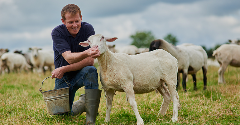News
‘Super nut’? Indonesia’s ‘best kept secret’ wins EU novel food approval
6 Dec 2022A previously obscure, nutrient-rich Indonesian nut is set to hit European shelves after winning EU novel foods approval that could also help protect under-threat kenari forests on the archipelago.
Kenari is primed for debut in the EU’s 27 member states after decades of use in mostly eastern and northern Indonesian islands but under a shadow as logging and mining activity threaten the very kenari forests from which the nuts are sourced.

The co-founders of the Indonesian firm Kawanasi Sehat Dasacatur, which lodged the just-approved EU submission in 2020, told Ingredients Network that aside from opening important European markets, the novel foods approval bolstered its intensifying lobbying of sector stakeholders and the Indonesian government to protect some kenari old growth forests.
“It is central to Kawanasi’s business core that we support the protection of the wild forest,” Felix Kusmanto and Debby Amalia King said ahead of a meeting this month with Indonesian government officials about expanding kenari tree preservation.
“The novel foods approval helps build our case for sure so we are very excited about what it means for protecting Indonesian kenari growth areas – and growing our business. It’s all about building the ‘kenari army’.”
EFSA: ‘no safety objections’
The European Food Safety Authority (EFSA) found ‘no safety objections’ after assessing Kawanasi’s 2020 novel foods submission that kenari nut (Canarium amboinense Hochr.) was a traditional food (TF) suitable for the EU food supply.
Kawanasi’s submission asserted wild-harvested kenari nuts can play a dietary role similar to other popular nuts like almonds, cashew, walnuts, Brazil nuts and macadamias.
It cites use in cereals, bakery and confectionery products at a maximum of 15g per 100g; prepared dishes at 10g/100g as well as whole nut snack products.
Kawanasi calls the nut Indonesia’s “best kept secret super nut”.
Married couple Kusmanto and King began selling kenari nuts in Indonesia under via Kawanasi’s ‘East Forest Kenari Nut’ brand about six years ago. The firm has since expanded into Singapore, Japan, New Zealand and North America.
They said the EU novel foods approval presented a massive opportunity, but was taking a methodical approach tightly focused on the authorized categories specified within the novel foods approval.
“We put a lot of work into this dossier […],” they said. “We emphasize this novel foods approval applies only to a few food categories which was our intention given the scale limitations of wild harvesting kenari at this time.”
“We intend to keep a balance between business development and preserving wild forest.”
They said wild harvesting kenari trees meant avoiding the mono-agriculture practices common in many other nuts, even if yields were lower.
Gelato maker eyes kenari expansion
Another firm in the kenari space is Indonesian/Hong Kong-based firm FairFlavor Foods, which at the beginning of 2022 debuted a brand of kenari-based gelato ice cream called Nth Wonder currently sold only via online retailers Shopee and Tokopedia in Indonesia.
Kawanasi’s novel foods approval does not include gelato – but FairFlavor Foods co-founder Marcelo Giannuzzi said his company was exploring options to bring its gelatos to the EU.
“The core of our technology is a gelato pre-mix you can send anywhere in the world without cold chain, which enables us to partner with gelaterias and co-packers from Rome to New York,” he said.
Kenari nut provenance
The kenari nut has a creamy, macadamia-like flavor and is suitable for formulation into many foods, as well as being consumed as a nut.
Although native to Indonesia, kenari goes by other names in other countries like galip nut (Papua New Guinea), ngali nut (Solomon Island), nangai nut (Vanuatu), kunarinattsu (Japan) and kkeunali neoscheu (Korea).
The dominant kenari geographical source is an eastern Indonesian island called Alor, with something like 16,000 tons of kenari produced there annually.
Using the kernel of the 3-6 centimeter ovoid fruit as a foodstuff is a relatively new occurrence, even in Indonesia, where kenari trees have been traditionally logged for timber.
Harvesting them for their fruit is providing a commercial reason to conserve kenari old growth areas and seeding plantations with kenari nut harvest typically possible within 7-10 years.
 © AdobeStock/Harismoyo
© AdobeStock/Harismoyo
Kenari ecosystem and community benefits
Queensland-based Griffin University professor in agriculture ecology, Helen Wallace, said the budding kenari industry could benefit the environment and harvesters alike.
"This nut has huge potential to benefit smallholder farmers and give them income from their rainforest trees," the professor told the BBC. "If we could commercialize more wild nuts from the rainforest like kenari it will help to diversify our food systems, prevent carbon loss and preserve our rainforests."
Giannuzzi said, “by using a sustainable source for our gelato and with our kenari tree nursery reforestation project, we save trees and plant trees, it's that simple.”
Kenari is a source of magnesium, manganese, iron, phosphorous, potassium, vitamin E, amino acids and omega-3s.
Related news

California companies required to disclose heavy metal content in baby food
10 Jan 2025
As of January 2025, baby food manufacturers selling in California must disclose test results for four heavy metals – arsenic, lead, cadmium, and mercury – via an on-pack QR code.
Read more
Snack trends, ingredient claims, and plant-based perceptions: Highlights from Fi Europe 2023, part 1
7 Dec 2023
Value-led snacking, sustainability storytelling, and the importance of having a ‘star ingredient’: we asked consumer analysts and market experts at Fi Europe about the trends and innovations that are shaping the food industry.
Read more
Confirmed: California bans four ‘toxic’ food additives
10 Oct 2023
Four food additives, including the colouring Red No. 3, will be banned in food in the US state of California over safety concerns, with public health campaigners hoping this will spark a nationwide ban in the coming years.
Read more
Advocacy groups condemn EU Commission for backpedalling on animal rights
3 Oct 2023
Amid rumours that the EU may abandon its plans to improve animal welfare in farming and end the use of cages, many stakeholders have condemned this possibility and urged the EU to reconsider.
Read more
Poland and Ukraine attempt to resolve grain dispute
29 Sep 2023
Poland and Ukraine have begun talks to try to resolve a dispute regarding the ban on Kyiv’s grain imports that prompted Kyiv to file a lawsuit to the World Trade Organization.
Read more
The EU may be set to scrap its sustainability commitments
27 Sep 2023
A speech delivered by President Ursula von der Leyen last week inferred that the EU could be drawing back on its commitments to create a more sustainable and healthier food system.
Read more
Industry first: Mosa Meat becomes first cultivated meat startup to gain B Corp certification
11 Sep 2023
A first for the industry, Dutch cultivated meat company Mosa Meat announced that it has received B Corp certification and will soon apply for regulatory approval across the globe.
Read more
German supermarket trials climate-centric pricing model
29 Aug 2023
German discount supermarket Penny has trialled increasing product prices to mirror their health and environmental costs.
Read more
EPR fee delay spurs concerns over UK’s sustainability commitment
8 Aug 2023
The UK government’s decision to push back the introduction of fees for the Extended Producer Responsibility (EPR) due to inflation has raised doubts about whether this sustainability commitment will ever be realised.
Read more
Latino-owned food startups tackle climate change
25 Jul 2023
A growing list of Latino-founded food and beverage startups in the US are putting sustainability at the forefront of their businesses for the sake of the planet.
Read more